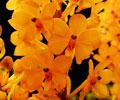|
|
|
|
|
| |
Flasks of
Ascocentrum miniatum '#1' × '#2' |
|
| |
|
|
| |
| Number: |
TN2536 |
| Name: |
Ascocentrum miniatum '#1' × '#2'
|
| Type: |
outcross (What's that?) |
|
Seed Donor: |
Dale Borders
|
|
Click to Enlarge

Pod Parent Inflorescence |
Click to Enlarge

Pollen Parent Flowers |
Click to Enlarge

Pollen Parent Blooming Plant |
|
|
|
| |
Culture Notes from Donor: Parent plants: Temperature range I (60-83°F)
Comments: A miniature species only growing to 6" (15 cm) tall.
For additional origin/habitat information supplied courtesy of
Charles and Margaret Baker, see further below, near the bottom of this page.
|
Temperatures we attempt to use in the lab & greenhouse:
| For Species: |
|
Spring, Summer, Autumn: days average 86°F, nights 72°F; best fit is Warm 90-70°F
(Source:
Baker's Web OSC) |
| For Species: |
|
Winter: days average 84°F, nights 54°F; best fit is Intermediate 83-60°F
(Source:
Baker's Web OSC) |
|
About the name...
| Etymology of |
Ascocentrum |
|
From latinized Greek "askos" hose; "kentron" spur. For the lip spur.
(Source:
Mayr & Schmucker 1998) |
| Etymology of |
miniatum |
|
From Latin "miniatus" lead-red, rust red.
(Source:
Mayr & Schmucker 1998) |
| Pronunciation of |
Ascocentrum |
|
as-koe-SEN-trum
(Source:
Hawkes 1978) |
| Pronunciation of |
miniatum |
|
min-ee-AH-tum
(Source:
Hawkes 1978) |
|
If you would like to direct someone to this web page, please copy and paste this URL into your email:
http://troymeyers.com/d?012536
| Flask Information |
| Availability: |
We have sold all of the flasks for this item. |
| You should: |
Consider getting individual plants or compots instead of a flask.
You can place a "Notify Flask Recipients" Request, and either we or a flask recipient may contact you when plants are available.
You may also place a "Notify Retries" Request, and if an identical pollination (the same parents) is done again, we'll let you know.
You may reserve a flask, but it's very unlikely you'll get one ...this could only happen if we found a flask that we didn't know we had. |
| Yield Estimate: |
240 plants (based on flask surveys done 08/22/2003 )
|
| Plantlet Sizes: |
From many flasks 10 - 20 mm plants (based on flask surveys done 04/06/2004 through 05/12/2004)
From one most recently surveyed flask 10 - 20 mm (05/12/2004)
|
|
You might also want to:
|
View the seed assay for this item.
View items of the same species.
View items of the same genus.
|
| Ordering Information |
| You are not currently logged in. |
|
You must be a registered user and be logged in to reserve a flask or place a notification request. Please log in:
|
|
|
|
|
|
| |
The origin/habitat information below is supplied courtesy of Charles and Margaret Baker
The following information is based on the name of the plant provided by the donor, and assumes that the name is correct. If the plant has been misidentified, then the following information may not be correct.
This text is copyrighted by the Bakers and may not be reproduced without permission.
ORIGIN/HABITAT: Thailand, Laos, Vietnam, Malaya, Java, and the
Philippines. In Thailand, these orchids are found throughout the country
from the northern mountains to the southwestern peninsula. They usually
grow in dry deciduous forests at elevations of 650-2500 ft. (200-760 m),
but collections have been made in the northwest mountains at 1000-3300 ft.
(300-1000 m), and near Loei in the northeast at about 2000 ft. (610 m). In
Malaya, plants are found on Langkawi Island, just off the northwest coast,
and in the northwestern state of Peris. In the Philippines, they grow at
600-2450 ft. (180-750 m) in Rizal Province on Luzon and on Mindanao in the
provinces of Agusan, Davao, Cotobato, and Lanao. In Java, these orchids
are quite common all over the island from near sea level to about 3950 ft.
(0-1200 m). Even though much of the natural habitat has been destroyed on
Java, plants readily colonize planted teak forests in humid areas, so this
species will probably survive despite the destruction of the natural
forest.
More about this information and the Bakers...
|
|
|
| |
|
|
|